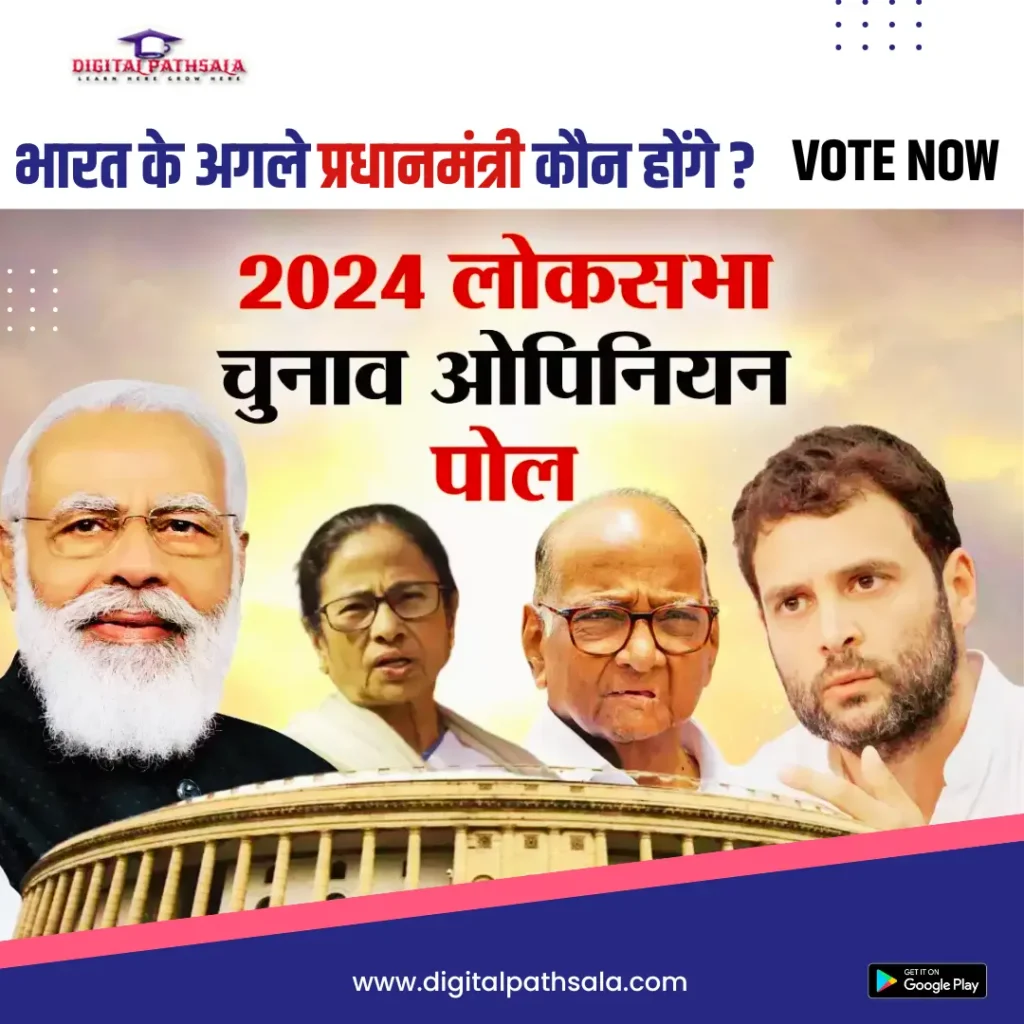Table of Contents
Opinion Poll 2024 Lok Sabha Election : भारत के अगले प्रधानमंत्री कौन होंगे ?
As the political landscape of India gears up for the 2024 Lok Sabha Election, the anticipation and speculation surrounding the potential outcomes have reached a fever pitch. In the run-up to the election, opinion polls have become a crucial tool for political analysts, parties, and the general public to gauge the sentiments of the electorate. These polls serve as a barometer for understanding the prevailing political winds and predicting the potential outcome of the election.

The Importance of Opinion Polls:
Opinion polls play a pivotal role in shaping the political narrative and strategy for political parties. They provide valuable insights into the preferences and opinions of the electorate, helping parties tailor their campaigns to address the concerns and aspirations of the voters. Additionally, opinion polls contribute to informed decision-making among voters by offering a snapshot of the political landscape, thereby influencing the political discourse leading up to the election.
Opinion Poll 2024 Lok Sabha Election :
Political parties of the country have started preparations for the Lok Sabha elections 2024. Every party is busy in making strategy in such a situation.In this opinion poll, an attempt has been made to know from the people that if you had to choose a next Prime Minister of India, then who would you choose?
List of Prime Ministers of India (1947-2023)
| Prime Minister of India from 1947 to 2023 | |
|---|---|
| Prime Minister Name | Period |
| Jawahar Lal Nehru | 15 Aug 1947 to 27-May-1964 |
| Gulzarilal Nanda | 27 May 1964 to 9 June 1964 |
| Lal Bahadur Shastri | 09-Jun-1964 to 11-Jan-1966 |
| Gulzarilal Nanda | 11-Jan-1966 to 24 January 1966 |
| Indira Gandhi | 24-Jan-1966 to 24-Mar-1977 |
| Morarji Desai | 24-Mar-1977 to 28-Jul-1979 |
| Charan Singh | 28-Jul-1979 to 14-Jan-1980 |
| Indira Gandhi | 14-Jan-1980 to 31-Oct-1984 |
| Rajiv Gandhi | 31-Oct-1984 to 02-Dec-1989 |
| Vishwanath Pratap Singh | 02-Dec-1989 to 10-Nov-1990 |
| Chandra Shekhar | 10-Nov-1990 to 21-Jun-1991 |
| P. V. Narasimha Rao | 21-Jun-1991 to 16-May-1996 |
| Atal Bihari Vajpayee | 16-May-1996 to 01-Jun-1996 |
| H. D. Deve Gowda | 01-Jun-1996 to 21-Apr-1997 |
| Atal Bihari Vajpayee | 19-Mar-1998 to 22-May-2004 |
| Dr. Manmohan Singh | 22-May-2004 to 26-May-2014 |
| Narendra Damodardas Modi | 26-May-2014 to Incumbent |
FAQ on 2024 Lok Sabha Election Opinion Polls
Q1: What is an Opinion Poll?
A1: An Opinion Poll is a survey conducted to gauge public opinion on various political issues, candidates, or parties. In the context of the 2024 Lok Sabha Election, it aims to predict voter preferences and potential election outcomes.
Q2: Why are Opinion Polls conducted for the Lok Sabha Election?
A2: Opinion Polls serve as a tool to understand the public sentiment, predict electoral trends, and provide insights into the potential outcome of the upcoming Lok Sabha Election. They are valuable for political parties, media, and the public to make informed decisions.
Q3: Who conducts Opinion Polls for the 2024 Lok Sabha Election?
A3: Opinion Polls are typically conducted by polling agencies, research organizations, and media outlets. These entities use various methodologies such as telephone surveys, online polls, and face-to-face interviews to gather data.
Q4: How accurate are Opinion Polls in predicting election results?
A4: While Opinion Polls provide valuable insights, their accuracy may vary. Several factors, such as sampling methods, timing, and the dynamic nature of politics, can influence results. They should be interpreted cautiously and considered as snapshots rather than definitive predictions.
Q5: When are Opinion Polls usually conducted in the context of the Lok Sabha Election?
A5: Opinion Polls are conducted at different intervals leading up to the election. They can start several months before the election date and continue until close to the polling day, providing a trend analysis of changing voter preferences.

